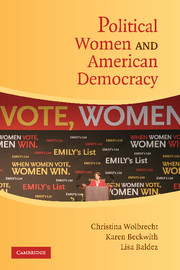Book contents
- Frontmatter
- Contents
- Preface
- List of Contributors
- Political Women and American Democracy
- 1 Introduction: What We Saw at the Revolution: Women in American Politics and Political Science
- 2 Gender as a Category of Analysis in American Political Development
- 3 Gender, Public Opinion, and Political Reasoning
- 4 Gender in the Aggregate, Gender in the Individual, Gender and Political Action
- 5 What Revolution? Incorporating Intersectionality in Women and Politics
- 6 Women's Movements and Women in Movements: Influencing American Democracy from the “Outside”?
- 7 Representation by Gender and Parties
- 8 Women as Candidates in American Politics: The Continuing Impact of Sex and Gender
- 9 Women as Officeholders: Linking Descriptive and Substantive Representation
- 10 Theorizing Women's Representation in the United States
- 11 Political Women in Comparative Democracies: A Primer for Americanists
- 12 Conclusion: Between Participation and Representation: Political Women and Democracy in the United States
- References
- Index
4 - Gender in the Aggregate, Gender in the Individual, Gender and Political Action
Published online by Cambridge University Press: 05 September 2012
- Frontmatter
- Contents
- Preface
- List of Contributors
- Political Women and American Democracy
- 1 Introduction: What We Saw at the Revolution: Women in American Politics and Political Science
- 2 Gender as a Category of Analysis in American Political Development
- 3 Gender, Public Opinion, and Political Reasoning
- 4 Gender in the Aggregate, Gender in the Individual, Gender and Political Action
- 5 What Revolution? Incorporating Intersectionality in Women and Politics
- 6 Women's Movements and Women in Movements: Influencing American Democracy from the “Outside”?
- 7 Representation by Gender and Parties
- 8 Women as Candidates in American Politics: The Continuing Impact of Sex and Gender
- 9 Women as Officeholders: Linking Descriptive and Substantive Representation
- 10 Theorizing Women's Representation in the United States
- 11 Political Women in Comparative Democracies: A Primer for Americanists
- 12 Conclusion: Between Participation and Representation: Political Women and Democracy in the United States
- References
- Index
Summary
The literature on gender and political action comes in two forms – one that is aggregate, sometimes institutional, and often centered historically, and one that is individual and largely focused on the here and now. We care about both, of course – about the social organization and deployment of gender and about what gender means in individual lives. In this chapter, I argue that we should encourage these two kinds of analysis to engage each other more intimately. This engagement would give political scientists the tools to say more about when, for whom, and for which outcomes gender matters. The conversation would give us better ways to understand how context makes gender relevant.
I believe gender is a property of collections of people and social systems. We care about it because it is about systematic disadvantage and advantage. In this chapter, I am especially interested in thinking about tools for identifying the political contexts in which this disadvantage and advantage come to matter in individual lives.
If Iris Young is right in saying that gender is not much about a “self-consciously, mutually acknowledging collective with a self-conscious purpose,” that instead gender is a “less organized and unself-conscious collective unity” (Young 1994, 724), then part of our task as social scientists interested in gender is to come to understand when social and political contexts can make gender relevant, sometimes in a way that people notice and call “gender,” and sometimes not.
- Type
- Chapter
- Information
- Political Women and American Democracy , pp. 50 - 63Publisher: Cambridge University PressPrint publication year: 2008
- 1
- Cited by



